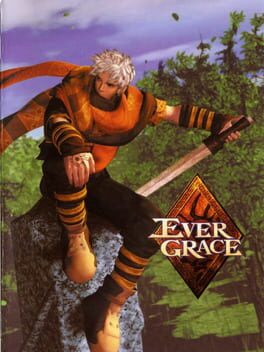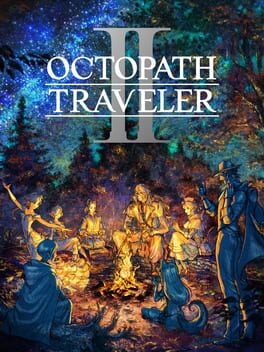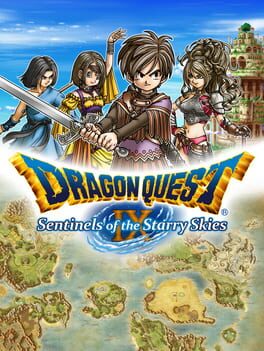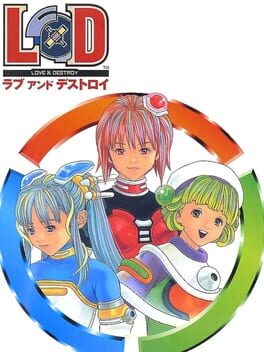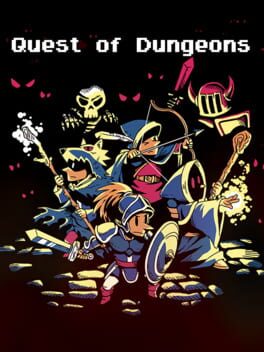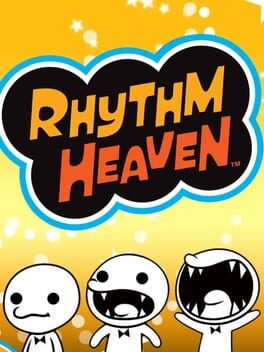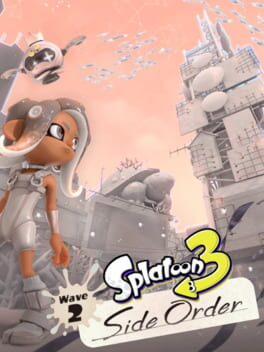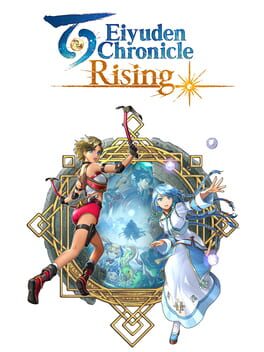oddapparition
Bio
Person who spends far more time thinking about games than actually playing them. Nintendo kid but PlayStation convert.
Trying to add weirder, shorter stuff to my catalog.
Person who spends far more time thinking about games than actually playing them. Nintendo kid but PlayStation convert.
Trying to add weirder, shorter stuff to my catalog.
Badges

Best Friends
Become mutual friends with at least 3 others

Noticed
Gained 3+ followers

Gamer
Played 250+ games

GOTY '23
Participated in the 2023 Game of the Year Event

N00b
Played 100+ games
Favorite Games
300
Total Games Played
014
Played in 2024
092
Games Backloggd
Recently Played See More
Recently Reviewed See More
A game flooded and rupturing with so much ambition, so many ideas (even with so many barely explored), and such a fascinating, evasive legacy that its incompleteness only creates infinite depth. Xenogears is the oddly-shaped kernel of a still-expanding universe, a beating, bleeding heart of a story that wears its many influences plainly and proudly while still feeling unsettlingly different from any of its peers. There’s so much more that could be here, that is here, that is instead in Perfect Works and Xenosaga and Xenoblade and in everything that’s taken inspiration from it since. I’m obsessed with Xenogears. I think I will be for a long time.
In Pseudoregalia’s interpretation of the Metroidvania, ability-locked progression is a suggestion and not a rule, because the movement tech turns you into a god and the world into a playground. Getting to new areas frequently feels like cheating. The individual bits of level design that permit virtually infinite different methods of achieving the same platforming goals are expertly crafted and endlessly fun to mess with.
Granted: it takes a while to cross that threshold into liberating, game-breaking euphoria because you are granted none of the movement mechanics off the bat nor given any explicit guidance as to how to acquire them. I wrestled with feeling lost and underpowered in Pseudoregalia’s directionless, open-ended world for hours before finally reaching a point where I felt like my progression was limited only by my skill and not my (shitty) sense of navigation, but oh my god was it worth it. It just took a while to get there.
And when I say I wrestled with this game I do mean that. I started over three or four times, just to solidify my memory of the first few areas and remember/make note of where the hell you’re meant to find the essential starter upgrades. At one point I started making a hand-drawn map, which was actually pretty fun until I realized what my real issue with this game was: not the lack of an in-game map or explicit direction as to where I’m meant to go, but the sense of disorientation that comes from moving from scene to scene. Though I love the music, visuals, complexity, and challenges to be found in each distinct and reasonably navigable area, I had no sense of a larger space in which all these individual sections cohered. I’m not sure you could stack each of these maps together into a singular overworld, and if you can, I definitely couldn't do it in my mind or on paper.
On the other hand: Pseudoregalia’s open-endedness and the lack of hints, direction, a narrative thread is what facilitates and encourages the reckless kind of exploration you can get away with once you’ve acquired the right skills and gotten good enough with the tech. It’s hard to overstate how fun it is to chain five different abilities to scale a cathedral or wall-jump across a bottomless pit. I got stuck only for a few minutes on any given obstacle; if I found myself completely stumped, I assumed I was lacking some upgrades that might make those obstacles more feasible, then came back later.
And there can still be a real joy in just soaking up the atmosphere and wandering about aimlessly: though I’ve only lighted touched on it, the game’s art direction and lo-fi aesthetics are gorgeous in their confident simplicity and the hazy, dreamlike feeling they create. I was often confused and directionless and puzzling over my notes, but that doesn't mean I wasn't having fun. That's part of the appeal! The hypnagogic feel of this game reinforces that. So if you're anything like me, just try to suppress any panic that arises over the eternal passage of time ticking forward in the real world while you're running in circles around the Empty Bailey and you'll be alright.
If you do have as terrible a sense of direction as I do, you might benefit from (lightly) using this fantastic map. I referred to it like a checklist (I’ve been here, I found this thing) and scanned it for hints (there’s an upgrade in this area, a hidden passage over there somewhere). Perhaps the best resource would be a friend who’s played it before, who can gently nudge you when you need it…
Pseudoregalia is so close to perfection at its highest points that it’s worth fuzzing through (or soaking in) the confusion it throws at you from the start. And seriously: Twilight Theatre in particular is one of the most elegantly designed and rewarding levels I’ve experienced in any video game. I might play it through again just to experience that area one more time. What a gem.
Granted: it takes a while to cross that threshold into liberating, game-breaking euphoria because you are granted none of the movement mechanics off the bat nor given any explicit guidance as to how to acquire them. I wrestled with feeling lost and underpowered in Pseudoregalia’s directionless, open-ended world for hours before finally reaching a point where I felt like my progression was limited only by my skill and not my (shitty) sense of navigation, but oh my god was it worth it. It just took a while to get there.
And when I say I wrestled with this game I do mean that. I started over three or four times, just to solidify my memory of the first few areas and remember/make note of where the hell you’re meant to find the essential starter upgrades. At one point I started making a hand-drawn map, which was actually pretty fun until I realized what my real issue with this game was: not the lack of an in-game map or explicit direction as to where I’m meant to go, but the sense of disorientation that comes from moving from scene to scene. Though I love the music, visuals, complexity, and challenges to be found in each distinct and reasonably navigable area, I had no sense of a larger space in which all these individual sections cohered. I’m not sure you could stack each of these maps together into a singular overworld, and if you can, I definitely couldn't do it in my mind or on paper.
On the other hand: Pseudoregalia’s open-endedness and the lack of hints, direction, a narrative thread is what facilitates and encourages the reckless kind of exploration you can get away with once you’ve acquired the right skills and gotten good enough with the tech. It’s hard to overstate how fun it is to chain five different abilities to scale a cathedral or wall-jump across a bottomless pit. I got stuck only for a few minutes on any given obstacle; if I found myself completely stumped, I assumed I was lacking some upgrades that might make those obstacles more feasible, then came back later.
And there can still be a real joy in just soaking up the atmosphere and wandering about aimlessly: though I’ve only lighted touched on it, the game’s art direction and lo-fi aesthetics are gorgeous in their confident simplicity and the hazy, dreamlike feeling they create. I was often confused and directionless and puzzling over my notes, but that doesn't mean I wasn't having fun. That's part of the appeal! The hypnagogic feel of this game reinforces that. So if you're anything like me, just try to suppress any panic that arises over the eternal passage of time ticking forward in the real world while you're running in circles around the Empty Bailey and you'll be alright.
If you do have as terrible a sense of direction as I do, you might benefit from (lightly) using this fantastic map. I referred to it like a checklist (I’ve been here, I found this thing) and scanned it for hints (there’s an upgrade in this area, a hidden passage over there somewhere). Perhaps the best resource would be a friend who’s played it before, who can gently nudge you when you need it…
Pseudoregalia is so close to perfection at its highest points that it’s worth fuzzing through (or soaking in) the confusion it throws at you from the start. And seriously: Twilight Theatre in particular is one of the most elegantly designed and rewarding levels I’ve experienced in any video game. I might play it through again just to experience that area one more time. What a gem.
Eiyuden Chronicle: Rising is a game about incremental progression, mostly in the form of busywork. This probably explains why I liked it so much, despite its commonly discussed flaws, or maybe because of them—I like ticking boxes and watching numbers go up, and fetch quests don’t bother me. I’ll talk to every NPC. I’ll fill out every corner of a map. I tried to 100% Breath of the Wild with the help of several spreadsheets and self-imposed restrictions on fast travel and exploits, even though I repeatedly ran into the fact that BotW isn’t really meant to be “completed” like that. EC:R is meant to be completed like that, or at least it seems to be, and I think that’s why this game can be either addictive or aggravating, depending on your fondness for clearing out quest logs for the sake of the quest log and not the content of the quests. And that’s without bringing up the often-awkward action RPG mechanics, which are appropriately simple but not particularly refined, at times finicky and unresponsive and at other times immensely rewarding to pull off.
I think it’s hard to pin down EC:R because it’s pretty good at things you might not expect it to be good at and pretty bad at other things that seem like they should be essential. Enemy combat mechanics eventually devolve into stun-locking frustration gimmicks, but the puzzle-platforming tech needed to reach hidden areas around the map is bizarrely fun and severely underutilized. Huge chunks of the plot and main character development are stuffed into the last few hours of the game, and yet the consistently just-above-par dialogue left me emotionally invested in the development of New Nevaeh and satisfied with the endearingly trope-y ending. EC:R is paced like a very fun town-builder mobile game, but I admit that once that feedback loop loses you, it’s hard to find the motivation to push much further. It was engaging enough for me to be hooked through the end of the main story and a little bit past that. Nonetheless, EC:R’s good parts give me faith that Hundred Heroes is probably going to be plenty of fun for a bit of a wider audience, especially if it’s closer in form to its spiritual predecessor games than Rising is.
I think it’s hard to pin down EC:R because it’s pretty good at things you might not expect it to be good at and pretty bad at other things that seem like they should be essential. Enemy combat mechanics eventually devolve into stun-locking frustration gimmicks, but the puzzle-platforming tech needed to reach hidden areas around the map is bizarrely fun and severely underutilized. Huge chunks of the plot and main character development are stuffed into the last few hours of the game, and yet the consistently just-above-par dialogue left me emotionally invested in the development of New Nevaeh and satisfied with the endearingly trope-y ending. EC:R is paced like a very fun town-builder mobile game, but I admit that once that feedback loop loses you, it’s hard to find the motivation to push much further. It was engaging enough for me to be hooked through the end of the main story and a little bit past that. Nonetheless, EC:R’s good parts give me faith that Hundred Heroes is probably going to be plenty of fun for a bit of a wider audience, especially if it’s closer in form to its spiritual predecessor games than Rising is.
